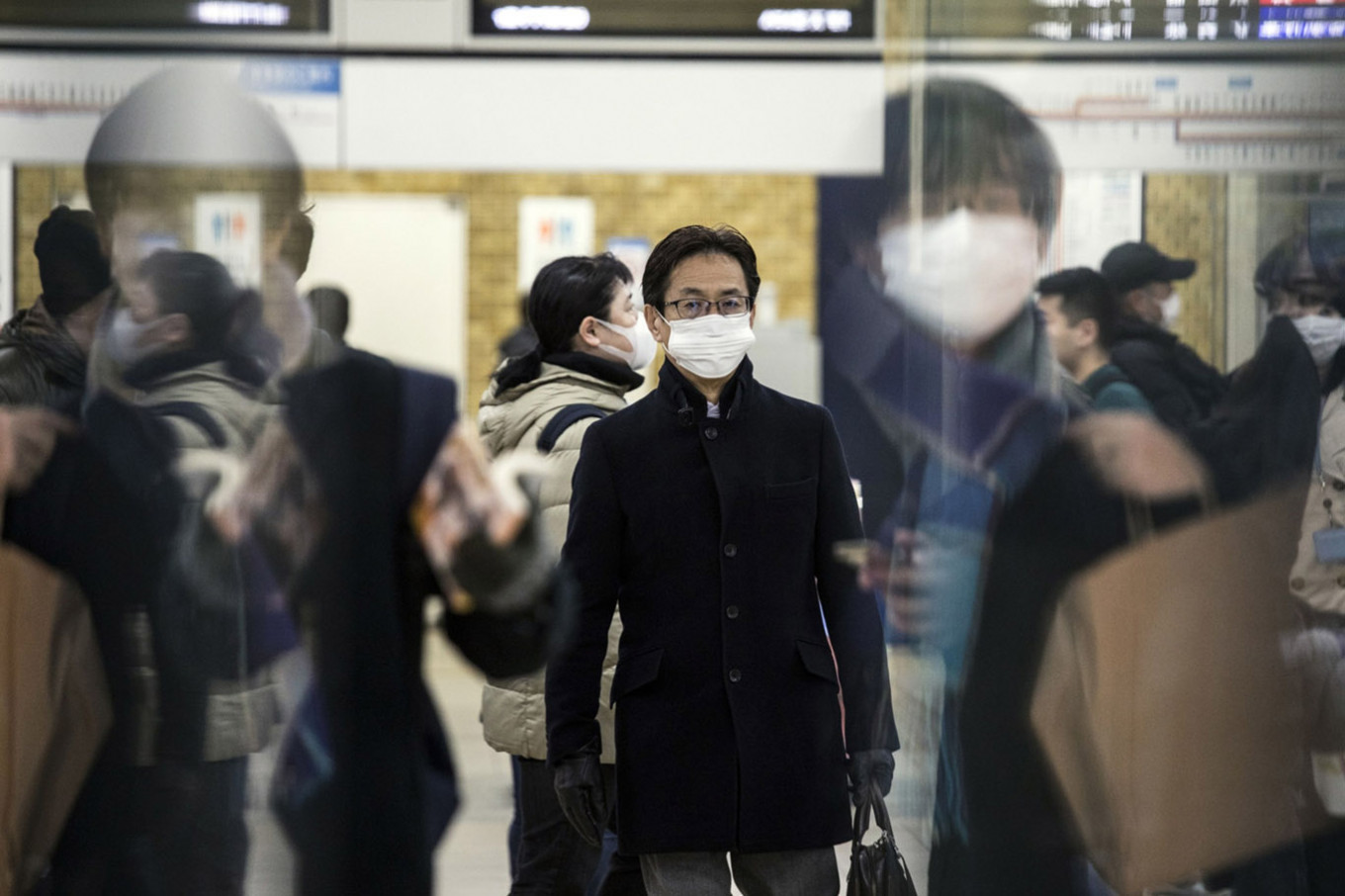Popular Reads
Top Results
Can't find what you're looking for?
View all search resultsPopular Reads
Top Results
Can't find what you're looking for?
View all search resultsJapan's Q1 GDP shrinks less than initial estimate but still faces steep recession
A series of recent April data including exports, factory output and jobs figures suggested Japan is facing its worst postwar slump in the current quarter as the outbreak forced people to stay at home and businesses to close globally.
Change text size
Gift Premium Articles
to Anyone
 A morning commuter wearing a protective mask walks through a train station in Tokyo, Japan, on Tuesday, Feb. 25, 2020. Japan saw a 6.3% economic contraction in the last three months of 2019, fueling criticism of Prime Minister Shinzo Abe’s decision to carry out the tax increase at a vulnerable time for the economy. After factoring in the early signs of impact from the coronavirus, analysts now believe the economy is falling into recession. Photographer: Shoko Takayasu/Bloomberg walk through train station in Tokyo, Japan, on Tuesday, Feb. 25, 2020. (Bloomberg/Shoko Takayasu)
A morning commuter wearing a protective mask walks through a train station in Tokyo, Japan, on Tuesday, Feb. 25, 2020. Japan saw a 6.3% economic contraction in the last three months of 2019, fueling criticism of Prime Minister Shinzo Abe’s decision to carry out the tax increase at a vulnerable time for the economy. After factoring in the early signs of impact from the coronavirus, analysts now believe the economy is falling into recession. Photographer: Shoko Takayasu/Bloomberg walk through train station in Tokyo, Japan, on Tuesday, Feb. 25, 2020. (Bloomberg/Shoko Takayasu)
J
apan's economy shrank less than initially estimated in the first quarter but the broad impact from the coronavirus crisis is still expected to send the country deeper into recession.
A series of recent April data including exports, factory output and jobs figures suggested Japan is facing its worst postwar slump in the current quarter as the outbreak forced people to stay at home and businesses to close globally.
The world's third-largest economy shrank an annualised 2.2 percent in January-March, revised data showed on Monday, less than the 3.4 percent contraction indicated in a preliminary reading and compared with a median market forecast of a 2.1 percent drop.
The revised data confirmed Japan had slipped into recession for the first time in 4-1/2 years, after a 7.2 percent contraction in October-December, pressured by last year's sales tax hike and the US-China trade war. Recessions are defined as two straight quarters of contraction.
On quarter-on-quarter basis, the economy contracted 0.6 percent in the first quarter compared with an initial reading of a 0.9 percent decline.
Business spending showed gains after the finance ministry's survey earlier this month, which was used to calculate the revised gross domestic product, drew fewer respondents than usual. Spending is expected to falter in coming months.
Capital spending rose 1.9 percent from the previous quarter, reversing from a preliminary 0.5 percent fall.
Private consumption, which accounts for more than half of Japan's economy, fell 0.8 percent compared with the preliminary 0.7 percent decline, as solid demand for daily necessities was offset by declines in spending on services.
Net exports - or exports minus imports - subtracted 0.2 percentage point from revised GDP growth, as the coronavirus slammed global demand.
Analysts are forecasting the economy will suffer an annualised contraction of more than 20 percent in April-June as Prime Minister Shinzo Abe announced a state of emergency and requested citizens to stay home and businesses to close to prevent the virus spreading.
Although the emergency was lifted in late May, the economy is expected to recover only moderately in coming months due to the pandemic's sweeping impact globally and at home.
The Bank of Japan is likely to maintain this month its projection that the economy will gradually recover from the damage in the latter half of this year, sources said.
The BOJ eased monetary policy for two straight months in April, joining government efforts to cushion the blow from the pandemic. The government has compiled two stimulus packages worth a combined $2.2 trillion.









